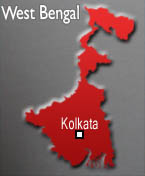Slogan war between different political parties in West Bengal
 Kolkata, Apr 16 : Different political parties in West Bengal evolve and churn out innovative, hard-hitting and impressive slogans to woo the voters as the key to their election campaigning.
Kolkata, Apr 16 : Different political parties in West Bengal evolve and churn out innovative, hard-hitting and impressive slogans to woo the voters as the key to their election campaigning.
The resounding cry of ''Vande Mataram'' (homage to motherland) or ''Inquilaab Zindabad'' (long live workers'' revolution) has the power to activate the adrenalin in one and all.
During the late-60s, when the Marxist-Leninists better known as Maoists had a strong influence in Bengal, frequent rallies had been the order of the day and anti-US feelings over Vietnam were at the peak, the entire city would reverberate to the slogans ''Amaar Naam, Tumaar Naam, Viet Nam (Our name, Your Name, Viet Nam) and ''Amaar Bari, Tumaar Bari, Naxalbari'' (My home, Your home, Naxal home).
West Bengal, which gave birth to the above slogans, is now witnessing a fiercely fought slogan war amongst the political parties as a part of the ongoing elections to the Lok Sabha.
However, this time around, it''s the state''s main opposition Trinamool Congress which seems to be more charged up in the election battle, coining new slogans almost every other day, pointing out the various failures of the ruling Left Front government in the state, besides laying claim to the traditional ''Vande Mataram''.
"Slogans are awakening the new generation in a new context. ''Kill industry, show love, shame on CPI(M)'' or ''kill farmers and show love, shame on CPI(M)'' - such slogans are newly relevant today. Over time, slogans have definite relevance and importance. And during the polls, during any revolution, they acquire greater significance," noted Ranjit Roy, a political worker.
The ruling Left Front, on the other hand, seems slightly subdued on the slogan front for a change, restricting itself to the left war cry of ''Inquilaab Zindabad'' and an appeal for vote on the party symbol with ''vote for survival on the star, hammer, sickle symbol'', of course all in regional Bengali language.
The voters admit that more than party manifestos or speeches of party candidates, it''s the catchy slogans which capture attention of the masses and the voters.
Sloganeers say relevance is the key factory in slogan writing.
So, from Nano, world''s cheapest car to Nandigram, industrialisation to agriculture, police atrocities to privatisation of education sector, almost every other activity in public life figures prominently in the slogans of different political parties.
Each party slogan writer coins the slogan on any issue keeping in mind the party''s policy on the matter.
"In West Bengal if you are concerned about politics and political parties, slogans are very important; because if we want to say anything to the masses, and for mass inspiration, slogans are very important. From the time of Netaji Subhas Chandra Bose when he was with Azad Hind Fouz (Indian National Army), till now if you see Communist Party of India (Marxist) or Trinamool Congress, or all the other parties, all are doing the same thing; they are making the slogans and giving this to their political campaigns," said Abhijit Ghosh, a voter.
Bengal has been home to great writers and poets from Bankim Chandra Chattopadhyay who wrote ''Vande Mataram...'', the national song, to Rabindranath Tagore who scripted ''Jana Gana Mana..'', the national anthem of India.
The state has a historic literary culture. What started with Netaji Subhash Chandra Bose''s "Give me blood, I will give you independence'', ''Ekla Chalo'' (even if alone, never lose heart) and ''Dilli Chalo'' have now filtered down to the slogans and poems that party workers are coining and writing.
The Bengali culture also gets reflected in the tableaux of the political parties which carry well etched pictures along with verses on various topics, all synchronised to the beats of the traditional dhaks (drums).
All said and done, in Bengal, its not just political campaign during elections, it''s basically a cultural representation of politics by various parties, which charms the prospective voters.
Indeed, not long ago, courtesy the creative instincts of Bengal, it was said: What Bengal does today, India thinks tomorrow! (ANI)